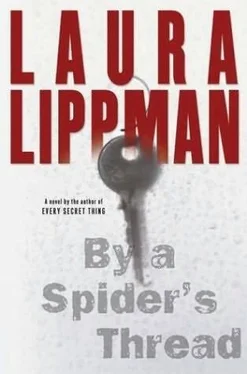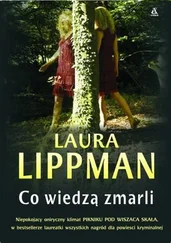"Do you really have to worry?" Tess was still of an age where high blood pressure, cholesterol, and bifocals were no more than rumors from a distant country, one she honestly thought she could avoid visiting.
"We live in a world of measurement, where everything is judged by whether it's going up or down. The stock market goes up, that's good. Your blood pressure goes up, that's bad. The stock market goes down, and that's bad. So your blood pressure goes higher, and that's bad, too."
Tess laughed. "I've noticed that whatever state agency you're posted to seems to shape your latest theories on life. When you were at Human Resources, you were talking a lot about the safety net, the social fabric, and the myth of empowerment. Now you're at the Department of Licensing and Regulation, and suddenly it's all about measurement."
"Well, given that I never have to think much about what I do at work, is it so wrong for me to think about it in a wider sense, to try and find meaning in the meaningless?"
"Damn, Uncle Donald." Tess gave the no-longer-profane profanity the full Baltimore pronunciation, so it had two syllables and a distinctive twang. "Are you angling for a transfer to some newly formed Department of Existentialism and Despair?"
"I'd like that," Donald said, chewing hard. The sandwiches here required huge, snapping bites, like those seen in nature documentaries about lions. One had to open jaws wide, stretching the hinge, and then chomp down with determined ferocity as if to break the spine of a small beast. "We have a state folklorist. Why not a state philosopher? If the new governor weren't a Republican, I bet I could get a job like that, maybe even use it to promote the case for slot machines. But it would probably be an at-will position, and I don't want to give up my PIN."
While most people associate PINs with ATMs, the Monaghan-Weinstein clans, steeped in generations of civil service, used it as shorthand for the Personal Identification Numbers in the state civil service. Keep your PIN, keep your job. Not necessarily the same job, as Uncle Donald's career illustrated, but some kind of post. Thirty years ago, when his state-senator boss had gone away for mail fraud, Donald's consolation prize had been a lifetime of full employment, moving from state agency to state agency as needs and budgets dictated. Wherever he went, the two constants were his clipboard and his frown. With those two, Uncle Donald said, anyone could survive in a bureaucracy.
"Anyway, what's your agenda this morning? It's a cinch you didn't call your uncle for his company, excellent though it is."
Uncle Donald's tone was light, but it made Tess squirm. She did have a bad habit of reaching out to her family only when she needed something. And she had been especially scarce in recent weeks, ducking dinners and get-togethers, citing the extra work she had taken on to make up for her layoff. She just hadn't been in the mood for family gatherings and the interrogations they inspired.
"This is a thank-you lunch. I really appreciate you steering the Rubin case to me."
"I find myself waiting for the 'but.' "
"No 'but.' Maybe a 'however,' or a 'yet.' Mark Rubin seemed to go out of his way to keep me from learning something. Did you know that Rubin's father-in-law is in prison for second-degree murder?"
"Sure. That's how we met."
"Because you know his father-in-law?"
"Because we visited prisons together. Rubin and I were in the same Jewish men's club, and we organized an outreach program for Jews in Maryland prisons. It was his idea, in fact."
Your uncle , Rubin had told her, is quite active in Jewish causes . She had assumed he was talking about B'nai B'rith.
"Jews in prison? What, for accounting crimes?"
"You know, you may qualify for citizenship in Israel, but I'm not sure a girl named Monaghan should traffic in those stereotypes. Someone who didn't know you so well could take offense."
"Would you feel better if I assumed everyone you visited was a murderer?"
"We've always had some very tough Jews, you know, for good and bad, throughout history. Gangsters, of course, but there's also the story of the Warsaw ghetto-"
"I'm sorry, Uncle Donald," she said, hoping a quick apology would derail him, but he was too wound up.
"Not to mention Sandy Koufax."
"How did we get on the subject of Sandy Koufax?"
"I'm just saying, he was a Jew, one of the greatest baseball players that ever lived, and when he didn't play in the World Series on Yom Kippur, he showed the world a little something. People talk about Jews being money grubbers, but it wasn't Sandy Koufax who was pushing Mr. Coffee, was it? No, he retired with some dignity, although he hardly made a tenth, a hundredth, of what a player like him would make today."
Uncle Donald normally spoke with a slight Baltimore accent, an almost Cockney-like inflection distinguished by its odd-shaped o sounds. But as he warmed to this topic, he began to sound more and more like his immigrant forebears. It was only a matter of time before Yiddish broke out. Tess decided to mollify him.
"What did your men's group do?"
"We visited Jewish inmates once a month and led them in an informal service. And we observed major holidays. Passover was my favorite."
"How do you do Passover in prison?"
"Well, they can't leave the door open for Elijah and there's no wine, but they chant 'Next year outside' instead of 'Next year in Jerusalem.' Very touching, actually."
"I didn't know you cared about religion. You never talk about it."
"Jews don't proselytize," Donald said. "Your parents decided to raise you with virtually no religious education, so who was I to interfere? Besides, I'd be suspicious of anyone who did so-called good works, then ran around talking about it. Sort of misses the point."
"I wouldn't say I was raised without a religious education. Dad told me his version, Mom told me hers, and I was free to make my own decisions. I opted for being a nonobservant Jewish Catholic who believes in Santa Claus and the Easter Bunny but can hang with the bitter-herb crowd at a seder. Remember last year? I kept the horseradish in my mouth longer than anyone except Crow, and he has an asbestos tongue from his time in Texas."
"He's a nice boy. How's his mother doing?"
"Fine, all things considered. They're Episcopalians, by the way. I mean, as long as we're taking inventory of who believes what."
"Do you believe in God, Tesser?"
Tess squirmed on the molded plastic chair, which had probably been in the Kibbitz Room since President Jimmy Carter's visit, which was featured on the wall above her in a series of newspaper articles, some framed, some shellacked to pieces of wood. She didn't want to talk with her uncle about her love life, but she was even more reluctant to discuss religion.
"Sure," she said. "Why not? So did Rubin get involved in this group because his father-in-law was in prison?"
"Oh, no. He met Natalie at the prison because her father was one of the men in our group. You see, she sought Mark out, very keen that her father embrace his faith, eager to know what she could do to help. She had found great comfort in Judaism after her father's arrest. But Boris Petrovich… well, Boris couldn't have been less interested in the program. I think he signed up because it was a nice diversion and we brought in good food. The man knew nothing about his own religion."
"Not unusual for a Soviet Jew. In fact, I'd say Natalie's the odd one, from what I know, choosing to live an observant life after almost twenty years of being wholly ignorant of Judaism."
"True, but Boris always seemed to be working some angle." Uncle Donald frowned at the memory. "It's a funny thing, charitable work. You might not go in expecting people to be overwhelmed with gratitude, but you think they'll be polite at least Petrovich was a bit of a jerk, a schemer through and through, whether he was asking for an extra macaroon or wheedling one of us to write a letter to get some privilege reinstated. But the daughter-the daughter was nothing but lovely."
Читать дальше












